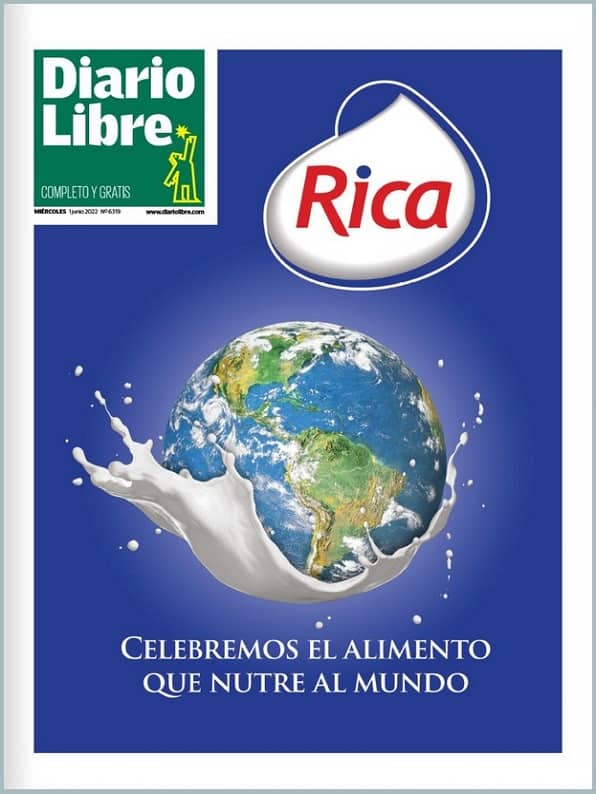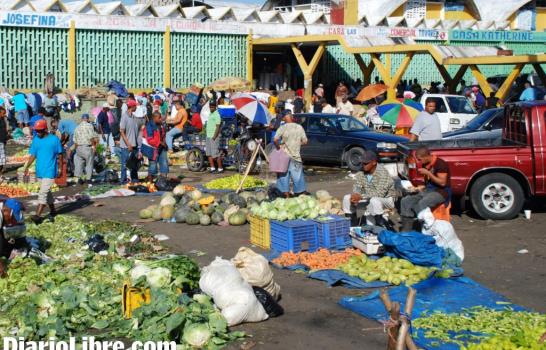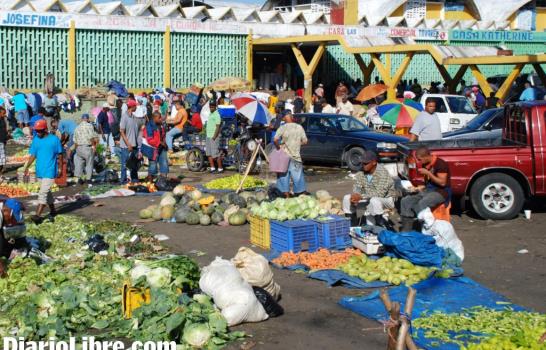Buying in the Duarte Market is a health risk
After a visit to the public market on Duarte Street it was evident that the farm products, meats and other edibles are often on the ground, which is evidence that there is no organizational plan for the Plaza
SD. The fruits, vegetables, staples and other foodstuffs that many purchase in the New Market on Duarte, more than feeding people, could turn into a broth of diarrhea - producing illnesses, due to the improper handling and exhibition of the products.
The majority of these products are sold after laying out on thin sacks or pieces of cardboard on the ground, surrounded by fetid odors, close to stopped-up drains and piles of garbage.
Besides these irregularities, many of these products are sold dirty, bruised and beyond ripe, because the sellers are under the obligation to take them to their houses and they do not give them the proper protection.
Around 800 sellers of peppers, tomatoes, greens, fruits and other produce occupy spaces in the public areas, the green areas and paths of the market, which puts into evidence the fact that the Plaza is overflowing beyond its physical capacity, and lately things are worse after the fire that destroyed part of its installations.
There are no demands made of the sellers, simply the payment of RD$20 each day for the right to use the space to sell their products under the most precarious of conditions.
The persons that have regular, assigned sites and contracts pay a municipal tariff which varies between RD$13.50 up to RD$50, according to the area. This is the daily cost, but they are permitted to accumulate payments, and pay the total at the end of each month. On average, the Mayor's office of the National District receives a yearly income of RD$20 million from all of the markets.
So, you can watch the barefoot peddler woman that goes between the piles of peppers and tomatoes, in order to hand some of the products to a client.
This does not only occur outside, but there are also scenes inside of the market, such as that of the boy that ties up the packages of greens on a wooden surface on which he puts his dirty tennis shoes that cover his feet next to the area that burned down, where last week there was still the smell of the fire.
Doctor Carlos Feliz, a health and epidemiological doctor, says that all of the vegetables or foods that are sold, without applying the corresponding sanitary controls, produce several diseases and infections.
In the case of the vegetables that are placed on the ground, they can cause diarrheas with the contamination of the E. coli bacteria and cholera, since the availability of water is not well managed, and the persons that handle the sales do not have the custom of washing their hands, so they easily contaminate what they sell, and what is most probable is that they produce water-related ailments.
In the epidemiological department of the Francisco Moscoso Puello Hospital, the demolished Luis Eduardo Aybar Hospital and the Robert Reid Cabral and Santo Socorro Children's hospitals, it is possible to observe dozens of cases related to gastrointestinal problems in patients that live in the Barrios that surround the market, such as Capotillo, La Zurza, Villas Agricolas, and others, such as Cristo Rey and Villa Mella, and that can be related to the lack of hygiene in the products that they buy in the market.
The worries
The lack of organization, health, and bulk sales worry the director general of Environment of the Ministry of Public Health, Luis Emilio Feliz Roa, who notes that the bacteria are dispersed throughout the places that are not adequately treated.
"Bacterias are charged with transmitting diseases, and in these markets raw products are sold, above all vegetables, because the plantains and the yucca, although they are contaminated, when the persons watch them, peel them and the fact that they are boiled eliminates the micro-organisms and there is no risk," said Feliz Roa.
In the cases of salad greens, tomatoes and other foodstuffs that are consumed raw, they can be contaminated and produce stomach illnesses, derived from contaminated food and water.
José José is one of the salesmen of greens and vegetables laid out on the floor. He recognizes that it is not right to sell in this manner, but he uses the cliché of "fathers of families," that need a place to work, and they don't have any other option.
Next to the bridge is Ruben, a fruit seller, who says that the market does not have a place, nor does he have the economic resources to pay a monthly quota of RD$405 or of RD $1500 to the City Government of the National District (ADN) for a permit to sell.
"What I do is resell some fruits and provisions, I set up here and when there are no people, I go someplace else," he said.
The deterioration
The lack of police, or municipal and environmental vigilance, facilitates the improvised sales, in the words of Luis Taveras, the President of the Merchants' Federation of the New Market on Duarte. In the Plaza there are only 2 National Police captains, 3 municipal police agents and they work from 8:30 in the morning until 2:00 in the afternoon.
The administrator of the market is Colonel Ramon Martinez Rosario, who, according to Taveras does what he can within the chaos.
He assured this reporter that there are no supervisors from the Ministry of Public Health and that four years ago the Federation requested the intervention in some areas, but until now they have no answers, although Feliz Roa says differently.
Taveras has been in the market for more than 20 years, and says that as a Federation they have had to take on responsibilities not only of organization but even of cleaning up.
He says that the cleaning brigades, security and repairs of the different locales are paid by the merchants.
He blames the different municipal authorities for being permissive in the construction of sales points and shacks in spaces that originally were for the ease of movement, both pedestrian as well as vehicular, by the visitors.
Given this situation, the director of environmental health of the Ministry explained that they began a process with the ADN in order to improve the sanitary conditions for the exhibition of the products and a series of actions aimed at guaranteeing the quality of the things that people buy.
Miguel Germosen, the director of Public Services of the ADN, said that they also have a plan for remodeling the areas of meats and the central nave of the market which they expect to have ready in the medium term.
He said that they would do the expansions that the overflowing Plaza requires.
How many are they?
The market on Duarte was established in 1973 with 830 commercial locales. There are now more than 1200 sales points spread inside and outside the physical area, including the bathroom areas that were closed in order to use them as sales locales.
In 2001 a study was carried out which showed that around 22,000 persons live on the activities of the market. At the present time 14 years later the number is greater.
SD. The fruits, vegetables, staples and other foodstuffs that many purchase in the New Market on Duarte, more than feeding people, could turn into a broth of diarrhea - producing illnesses, due to the improper handling and exhibition of the products.
The majority of these products are sold after laying out on thin sacks or pieces of cardboard on the ground, surrounded by fetid odors, close to stopped-up drains and piles of garbage.
Besides these irregularities, many of these products are sold dirty, bruised and beyond ripe, because the sellers are under the obligation to take them to their houses and they do not give them the proper protection.
Around 800 sellers of peppers, tomatoes, greens, fruits and other produce occupy spaces in the public areas, the green areas and paths of the market, which puts into evidence the fact that the Plaza is overflowing beyond its physical capacity, and lately things are worse after the fire that destroyed part of its installations.
There are no demands made of the sellers, simply the payment of RD$20 each day for the right to use the space to sell their products under the most precarious of conditions.
The persons that have regular, assigned sites and contracts pay a municipal tariff which varies between RD$13.50 up to RD$50, according to the area. This is the daily cost, but they are permitted to accumulate payments, and pay the total at the end of each month. On average, the Mayor's office of the National District receives a yearly income of RD$20 million from all of the markets.
So, you can watch the barefoot peddler woman that goes between the piles of peppers and tomatoes, in order to hand some of the products to a client.
This does not only occur outside, but there are also scenes inside of the market, such as that of the boy that ties up the packages of greens on a wooden surface on which he puts his dirty tennis shoes that cover his feet next to the area that burned down, where last week there was still the smell of the fire.
Doctor Carlos Feliz, a health and epidemiological doctor, says that all of the vegetables or foods that are sold, without applying the corresponding sanitary controls, produce several diseases and infections.
In the case of the vegetables that are placed on the ground, they can cause diarrheas with the contamination of the E. coli bacteria and cholera, since the availability of water is not well managed, and the persons that handle the sales do not have the custom of washing their hands, so they easily contaminate what they sell, and what is most probable is that they produce water-related ailments.
In the epidemiological department of the Francisco Moscoso Puello Hospital, the demolished Luis Eduardo Aybar Hospital and the Robert Reid Cabral and Santo Socorro Children's hospitals, it is possible to observe dozens of cases related to gastrointestinal problems in patients that live in the Barrios that surround the market, such as Capotillo, La Zurza, Villas Agricolas, and others, such as Cristo Rey and Villa Mella, and that can be related to the lack of hygiene in the products that they buy in the market.
The worries
The lack of organization, health, and bulk sales worry the director general of Environment of the Ministry of Public Health, Luis Emilio Feliz Roa, who notes that the bacteria are dispersed throughout the places that are not adequately treated.
"Bacterias are charged with transmitting diseases, and in these markets raw products are sold, above all vegetables, because the plantains and the yucca, although they are contaminated, when the persons watch them, peel them and the fact that they are boiled eliminates the micro-organisms and there is no risk," said Feliz Roa.
In the cases of salad greens, tomatoes and other foodstuffs that are consumed raw, they can be contaminated and produce stomach illnesses, derived from contaminated food and water.
José José is one of the salesmen of greens and vegetables laid out on the floor. He recognizes that it is not right to sell in this manner, but he uses the cliché of "fathers of families," that need a place to work, and they don't have any other option.
Next to the bridge is Ruben, a fruit seller, who says that the market does not have a place, nor does he have the economic resources to pay a monthly quota of RD$405 or of RD $1500 to the City Government of the National District (ADN) for a permit to sell.
"What I do is resell some fruits and provisions, I set up here and when there are no people, I go someplace else," he said.
The deterioration
The lack of police, or municipal and environmental vigilance, facilitates the improvised sales, in the words of Luis Taveras, the President of the Merchants' Federation of the New Market on Duarte. In the Plaza there are only 2 National Police captains, 3 municipal police agents and they work from 8:30 in the morning until 2:00 in the afternoon.
The administrator of the market is Colonel Ramon Martinez Rosario, who, according to Taveras does what he can within the chaos.
He assured this reporter that there are no supervisors from the Ministry of Public Health and that four years ago the Federation requested the intervention in some areas, but until now they have no answers, although Feliz Roa says differently.
Taveras has been in the market for more than 20 years, and says that as a Federation they have had to take on responsibilities not only of organization but even of cleaning up.
He says that the cleaning brigades, security and repairs of the different locales are paid by the merchants.
He blames the different municipal authorities for being permissive in the construction of sales points and shacks in spaces that originally were for the ease of movement, both pedestrian as well as vehicular, by the visitors.
Given this situation, the director of environmental health of the Ministry explained that they began a process with the ADN in order to improve the sanitary conditions for the exhibition of the products and a series of actions aimed at guaranteeing the quality of the things that people buy.
Miguel Germosen, the director of Public Services of the ADN, said that they also have a plan for remodeling the areas of meats and the central nave of the market which they expect to have ready in the medium term.
He said that they would do the expansions that the overflowing Plaza requires.
How many are they?
The market on Duarte was established in 1973 with 830 commercial locales. There are now more than 1200 sales points spread inside and outside the physical area, including the bathroom areas that were closed in order to use them as sales locales.
In 2001 a study was carried out which showed that around 22,000 persons live on the activities of the market. At the present time 14 years later the number is greater.


 Diario Libre
Diario Libre

 Diario Libre
Diario Libre